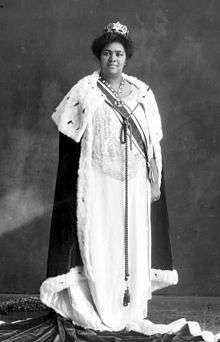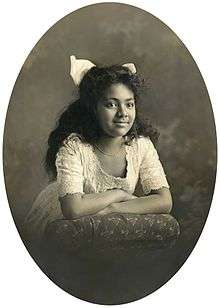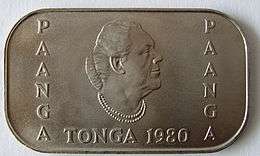Sālote Tupou III
| Sālote Tupou III | |||||
|---|---|---|---|---|---|
 Queen Salote in her coronation robe | |||||
| Queen of Tonga | |||||
| Reign | 5 April 1918 – 16 December 1965 | ||||
| Coronation | 11 October 1918, Nukuʻalofa | ||||
| Predecessor | George Tupou II | ||||
| Successor | Tāufaʻāhau Tupou IV | ||||
| Prime Ministers |
Tonga
| ||||
| Born |
13 March 1900 Royal Palace, Tonga | ||||
| Died |
16 December 1965 (aged 65) Aotea Hospital, Auckland, New Zealand | ||||
| Burial | Mala‘e Kula | ||||
| Spouse | |||||
| Issue |
Tāufaʻāhau Tupou IV Prince Uiliami Tuku‘aho Prince Fatafehi Tu'ipelehake | ||||
| |||||
| House | Tupou | ||||
| Father | George Tupou II | ||||
| Mother | Lavinia Veiongo | ||||
| Religion | Free Wesleyan Church | ||||
Sālote Tupou III (born Sālote Mafile‘o Pilolevu; 13 March 1900 – 16 December 1965) was the first Queen regnant and third Monarch of the Kingdom of Tonga from 1918 to her death in 1965. She reigned for nearly 48 years, longer than any other Tongan Monarch.
Early life

Sālote (Charlotte) was born on 13 March 1900 in Tonga as the eldest daughter and heir of King George Tupou II of Tonga and his first wife, Queen Lavinia Veiongo. She was not popular, as she was perceived as being born from the 'wrong mother' because of her mother's low rank and was disliked so much that it was not safe for her to go outside the palace garden.[1]
Her mother, Queen Lavinia died from tuberculosis on 25 April 1902. After her death, the Chiefs in Tonga urged King George Tupou II for many years to remarry to produce a male heir. On 11 November 1909, when the King finally married the 16-year-old ʻAnaseini Takipō, (half-sister of the rejected candidate 'Ofakivava'u', from the first search of a wife for the King), the chiefs were jubilant. Queen Anaseni gave birth twice, both girls:[2] HRH The Princess ʻOnelua (born 20 March 1911; died of convulsions aged six months, on 19 August 1911) and HRH The Princess ʻElisiva Fusipala Taukiʻonetuku (born 26 July 1912; died from tubercular peritonitis on 21 April 1933 aged 20).
Education
In December 1909 Sālote was sent to Auckland, New Zealand to start five years of education.[3] She did return to Tonga every Christmas holiday. After December 1914 the King ordered her to stay home in Tonga as hopes for Queen Anaseni giving birth to a male heir were low. She later began a course of instruction in Tongan history and customs.
Personal history
Married to Viliami Tungī Mailefihi, an adult noble then 28 years old (12 years her senior) in 1916 at the young age of 16, she became the mother of Siaosi Tāufa‘āhau Tupoulahi – later King Tāufa‘āhau Tupou IV –, Uiliami Tuku‘aho (5 November 1920 – 28 April 1936), and Sione Ngū Manumataongo – later Tu‘i Pelehake (Fatafehi) –, plus three miscarriages.
Queen Salote died 16 December 1965 at Auckland City Hospital, after a long illness. Her body was flown back to Tonga.[3] She was well known for her height, standing 6 ft 3 in (1.91 metres) tall in her prime.[4]
Achievements

Her marriage to Tungī Mailefihi had been a masterstroke of her father, as Tungī was a direct descendant of the Tu‘i Ha‘atakalaua, which at that time was seen as belonging to the Tu‘i Tonga's kauhala‘uta. Their children therefore combined the blood of the three grand royal dynasties in Tonga.
In 1920–1921, she assisted the Bernice P. Bishop Museum's Bayard Dominick Expedition with their mapping of Tongan archaeological sites by providing access to localities and information. The expedition's reports on the Tongan past—including a large volume of material which still remains unpublished even today—were primarily compiled by Edward Winslow Gifford and provided the groundwork for comprehensive studies of the pre-contact history of the Tongans (Burley 1998). She was also a keen writer and author of dance songs and love poems.
She brought Tonga to international attention when, during her sole visit to Europe, she attended the 1953 coronation of Queen Elizabeth II in London. During the coronation procession, it began to rain and hoods were placed on the carriages in the procession. As Tongan custom dictates that one should not imitate the actions of persons one is honouring,[5] she refused a hood and rode through the pouring rain in an open carriage, endearing herself to spectators.[5] She served as Chairman of the Tonga Traditions Committee 1954–1965 and patronised the Tonga Red Cross Society.
Honours







Notes
- ↑ Wood-Ellem, Elizabeth (1999). Queen Sālote of Tonga: the story of an era, 1900–1965. Auckland, NZ: Auckland University Press. ISBN 978-1-86940-205-1. OCLC 262293605. Archived from the original on 20 February 2012.
- ↑ "Tupou9". Royalark.net. Retrieved 2016-04-27.
- 1 2 Queen Salote Tupou (1900–1965), Tepapa.govt.nz, Retrieved 2 August 2016
- ↑ "GREAT BRITAIN: Reunion in Paradise". TIME. 28 December 1953. Retrieved 12 January 2010.
- 1 2 "In the Court of the King of Tonga". Nytimes.com. Retrieved 4 September 2015.
- 1 2 3 4 5 6 "Tupou10". Royalark.net. Retrieved 2016-04-27.
- ↑
- ↑ "Tonga profile – Timeline – BBC News". M.bbc.co.uk. Retrieved 4 September 2015.
- ↑ "Queen Salote's Cloak – Picture of Tonga National Cultural Centre, Tongatapu Island". Tripadvisor.com. Retrieved 4 September 2015.
- ↑ "Image: lotte-meitner-graf-salote-tupou-iii-1900-65-of-tonga.jpg, (366 × 488 px)". Imgc.allpostersimages.com. Retrieved 4 September 2015.
References
- Bain, Kenneth Ross., (1967), The Friendly Islanders: a story of Queen Salote and her people, London; Hodder & Stoughton.
- Burley, David V. (1998): Tongan Archaeology and the Tongan Past, 2850-150 B.P. Journal of World Prehistory 12 (3): 337–392. doi:10.1023/A:1022322303769 (HTML abstract)
- Kaeppler, A.L.; Taumoefolau, M.; Tukuʻaho, N., & Wood-Ellem, E. (2004): Songs and poems of Queen Salote. ISBN 978-982-213-008-9
- Luke, Sir Harry (1954), Queen Salote & Her Kingdom, London:Putnam.
- Wood-Ellem, Elizabeth (1999), Queen Salote of Tonga: The Story of an Era 1900–1965, Auckland:Auckland University Press, ISBN 978-1-86940-205-1
External links

| Regnal titles | ||
|---|---|---|
| Preceded by George Tupou II |
Queen of Tonga 1918–1965 |
Succeeded by Tāufaʻāhau Tupou IV |